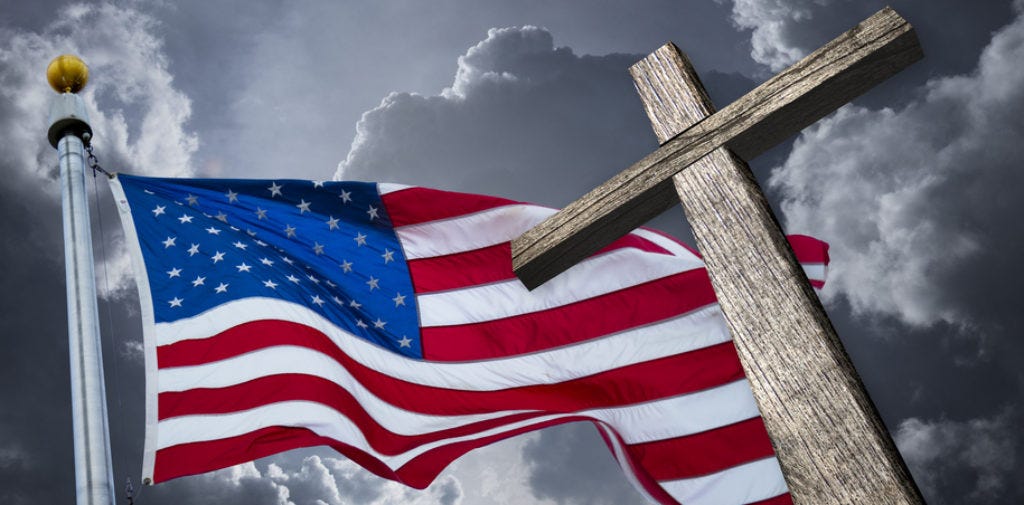Christianity Isn’t Your Campaign Slogan
Why “we’re saving Christianity” is idolatry dressed in campaign clothes.
The Claim
Earlier this week on The Benny Show, Eric Trump said this about the political moment his family believes they are leading:
“We’re saving Christianity, we’re saving God, we’re saving the family unit.”
The remarks came in a segment celebrating recent political wins and reading them as signs of God’s favor. A few beats later, the rhetoric turned overtly biblical: this is David versus Goliath; media hostility is proof of righteousness; providence shows itself in favorable headlines and near-miss tragedies that supposedly mark divine favor.
I don’t write this to score partisan points. I write it because Christians should be the first to say: this is spiritually corrosive and theologically upside down.
What Christians Confess
Christianity does not need rescuers. The gospel proclaims the reverse: God saves us. When we claim to “save Christianity,” we are not defending the faith; we are attempting to replace its Savior. That move—sincere or cynical—turns faith into a brand and Jesus into a mascot.
There is a name for this: civil religion—the borrowing of church language to baptize a political project. It’s a bipartisan temptation across the spectrum. But it’s on painful display here: spiritual vocabulary is conscripted to crown a faction and condemn its critics. That is not Christian witness. It is idolatry with a hymn soundtrack.
Don’t Proof-Text Politics
Then there is the David-and-Goliath talk. Scripture isn’t a costume we wear to sanctify our grievance. The David story isn’t about selectively labeling opponents as giants and ourselves as anointed. It is about God’s holiness, the humility of His servant, and the unlikely means by which God delivers His people. When we declare ourselves David on our own authority—when we appoint ourselves the righteous remnant by press release—we are no longer reading the Bible; we are proof-texting politics.
Judge by Fruit, Not Hype
Christians test claims—spiritual and political—by examining fruit: truthfulness, gentleness, self-control, faithfulness, love of neighbor. If our speech derides bodies, delights in humiliation, or spreads what we know isn’t true, the fruit is rotten—no matter how often we say “God” and “peace.” Words form us. Rhetoric becomes habit. Habit becomes character. If our tone can’t pass the Imago Dei test—honoring the dignity of those we oppose—it has failed the Christian one.
Providence Isn’t a Poll
Announcing that favorable court rulings, media cycles, or photo-ready coincidences are sure signs of divine endorsement is not faith; it’s superstition. Christians are called to discernment, which is slow, humble, accountable, and suspicious of triumphalism—especially our own.
What Faithful Witness Looks Like
Why does this matter beyond a clip? Because language like “we’re saving God” does more than overheat the room. It reshapes Christian imagination. It trains believers to see the church as a campaign arm, enemies as necessary foils, and victory as validation. It offers an easy identity—“we are the righteous under siege”—that requires little repentance and even less neighbor-love. And it justifies contempt as courage.
This isn’t about toning down our convictions. I have strong beliefs and say them plainly. It’s about refusing a counterfeit gospel that needs enemies more than it needs neighbors. It’s about resisting the constant pressure to collapse the kingdom of God into the success of any political project, left, right, or otherwise.
There is also a practical cost. When Christian language is fused to a political personality, our public credibility becomes hostage to that person’s fortunes. Their failures become our failures; their exaggerations become our witness. The watching world learns to hear the name of Jesus as a slogan for power rather than a summons to repentance, mercy, and truth. And our younger believers—already suspicious of performative religion—learn that faith is just one more tribal badge. Many will walk away from that. I don’t blame them.
Let’s be clear about what faithful public Christianity looks like in a bruised republic:
Speak truth without spin and refuse to bear false witness even when a lie would help “our side.”
Pray for leaders we oppose—not as performance art but because we actually believe they bear God’s image and our prayers matter.
Practice enemy-love in everyday life: refuse mockery, refuse dehumanization, refuse to baptize cruelty as boldness.
Do not outsource discipleship to pundits and politicians, no matter how charismatic or effective they may be.
Tell the truth about the church’s mission: not to baptize a bloc, but to bear witness to the King who is not on any ballot.
If we want peace—real peace—we will have to refuse the sugar high of triumphalist rhetoric that mistakes domination for discipleship. Peace is not merely the absence of war or the success of our coalition. It is the presence of mercy, the slow work of reconciliation, the daily disciplines of honesty, humility, and neighbor-love.
A Practice for the Week
I’m not interested in “owning” Eric Trump or The Benny Show. I am interested in owning my responsibility as a Christian writer in public: to name what is un-Christian when it parades as Christian.
So here is my simple plea to readers across the spectrum:
Refuse the costume of civil religion. God is not a campaign surrogate. Christianity does not need saving; Christians need sanctifying.
Reject proof-texting politics. We don’t get to anoint ourselves David. Let your fruit do the talking.
Re-center the gospel. Measure our political speech by the cross: Does it tell the truth? Does it honor the image of God in opponents? Does it sound like a people who have been shown mercy?
A pointed practice for the week: Before you post or share a political clip that flatters your side, ask three questions out loud: (1) Is it true? (2) Is it neighbor-honoring? (3) Does it center the cross—or a flag? If any answer is “no,” don’t share it. Pray instead—for the leader you oppose and for the integrity of your own witness.


